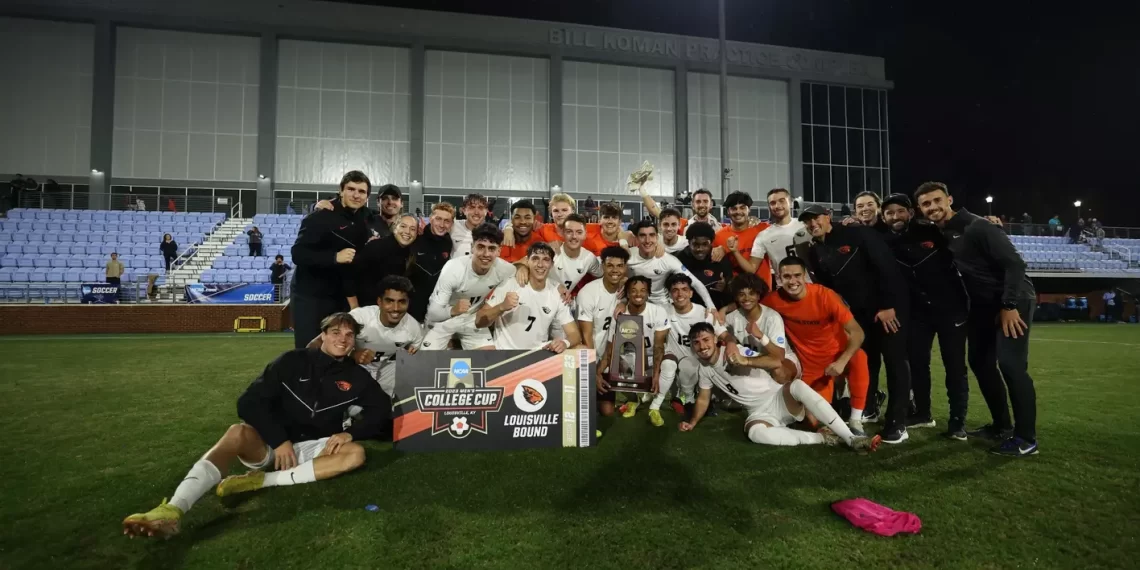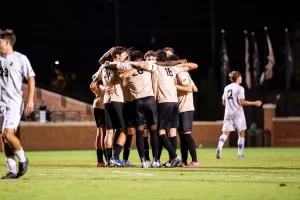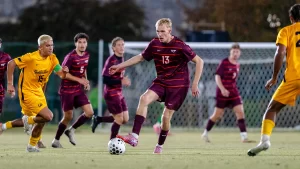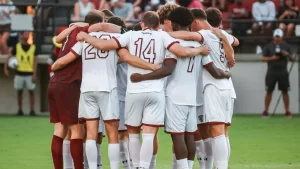We began with 211 teams playing across the country, from the Pacific Northwest to southern Florida, from New England to Los Angeles, and everywhere in between. Now, we’re down to four teams who will convene in Louisville, Kentucky with one goal in mind: become the kings of college soccer. Two semifinal matches on Friday will determine which two teams will play in the College Cup Final next Monday, December 11. With those aforementioned semifinals coming up in a few days, let’s take a look at how each team got here and break down each matchup. BY Brian LUdden
Semifinal 1
(5) West Virginia vs. (9) Clemson
Friday’s first semifinal matchup will pit a team making its first ever College Cup appearance against a team that is making their 10th.
West Virginia punched their ticket to the College Cup for the first time in history with their 3-1 win over Loyola Marymount on Saturday. The Mountaineers are tied for the second most wins in the nation, with 17 so far on the season. Among those 17 are wins over Portland, Marshall, and Vermont. Three wins from three in the NCAA Tournament (vs. Louisville, Vermont, and Loyola Marymount) have put West Virginia just two wins away from writing their names in college soccer history. Before they can worry about that, however, they face a team that has been here before and won the National Championship as recently as 2021. Although they are slightly a higher seed and have been among the best teams in the nation all year, head coach Dan Stratford will be hoping that his players don’t lose focus under the bright lights of Lynn Family Stadium.
Speaking of the players, a player to watch for West Virginia will undoubtedly be Yutaro Tsukada. The senior forward has racked up 12 goals on the season, with most of those coming when it mattered the most. Tsukada has scored seven goals in the past seven games, and has a goal in each round of the NCAA Tournament so far, earning his head coach Dan Stratford’s praise: “I’m really pleased for him,” Stratford explained. “This year has been a really wonderful kind of evolution for him.” As one of the most in-form players in the nation, Tsukada will be hoping to continue his hot streak and lead the Mountaineers to the College Cup final. On the defensive side, goalkeeper Jackson Lee will look to shut down a high-scoring Clemson team that sits first in the nation in goals scored.
Lining up on the other side of the pitch will be the ACC Champion, Clemson Tigers. As mentioned earlier, this is Clemson’s tenth College Cup appearance, and second in the past three years. Clemson enjoyed a 3-0 victory over Charlotte in the first round, followed by a trip up to New Hampshire, where they ran away with a narrow 1-0 victory. In the quarterfinals, it was two first half goals that paved the way for Clemson, as they earned a third consecutive shutout victory, this time by a 2-0 scoreline over Stanford. Despite typically being known as more of an offensive rather than defensive team and leading the country in goals scored, Clemson is the only team in the College Cup who have yet to concede a goal in the NCAA Tournament. Head coach Mike Noonan offered his take on Clemson’s defensive strengths so far, explaining how maintaining possession could be the best way to tame Tsukada and other West Virginia playmakers. “If we have the ball it’s going to be difficult for them, and if we’re going forward it’s going to be difficult for the playmakers to get the ball,” Noonan explained in a virtual press conference on Monday. They sometimes say that “offense is the best defense”, and having found a seemingly perfect balance between the two, that could very well be the mindset for Clemson on Friday night.
The last line of defense for Clemson is goalkeeper Joseph Andema, who made a few fine saves on Saturday night to preserve a clean sheet vs. Stanford. After keeping three clean sheets during the regular season, Andema has now doubled his season tally in the NCAA Tournament. He, along with the Clemson back line, will look to shut down West Virginia’s scoring threats. Attacking wise, Ousmanne Sylla leads Clemson in both goals and assists, with 12 and 10 respectively. Although his four-match goal streak came to an end vs. Stanford, he will hope to remain a danger and cause problems for the West Virginia defense.
There’s no denying the fact that West Virginia is a very good team. Coming from one of college soccer’s best conferences and reaching the College Cup is no easy feat. However, Clemson was my pick to win it all from the beginning, and I actually predicted this matchup to happen back in my predictions article. I haven’t seen anything to change my mind, and ultimately I think Clemson’s strong attack and defense, coupled with their experience at this stage, proves to be too much for West Virginia.
Prediction: Clemson 3, West Virginia 1
Semifinal 2
(2) Notre Dame vs. Oregon State
Friday’s nightcap brings a similar situation, with one team having recent College Cup experience while the other has none at all. #2 seed Notre Dame makes its second appearance in three years, facing an unseeded Oregon State team making its first College Cup appearance in program history.
Notre Dame spent some of the season atop the rankings, and appeared well positioned to secure the top overall seed. However, that all changed in the ACC Tournament quarterfinals, as they fell 4-3 to Louisville and Marshall won the Sun Belt. Nonetheless, the Fighting Irish were given the #2 seed and home field advantage through the quarterfinals. After shutting out Kentucky 2-0 and surviving an upset bid from Western Michigan, the Fighting Irish used their home-field advantage against Indiana, knocking off the Hoosiers on penalty kicks in front of a packed Alumni Stadium. Playing in the ACC allows Notre Dame to play some of the best teams in college soccer each year. Head coach Chad Riley even pointed out the fact that “playing in the ACC just prepares teams week in and week out for the NCAA Tournament.” However, despite the experience of playing some of the top teams every year, they’re now faced with the task of playing a team that they don’t normally go up against. Notre Dame and Oregon State have met just once all time, a 2-1 Notre Dame victory back in 2004, where starting for the Fighting Irish was none other than current Oregon State head coach Greg Dalby. Dalby and Riley played together for one year in 2003, which is one of the storylines heading into the match. Riley explained how he and Dalby were in communication this weekend, joking about how he sent Dalby a few pictures wearing a Notre Dame shirt back in the day to “remind him of where he made his name”.
Shifting focus back to the players who will be on the field Friday night, two players to watch for Notre Dame will be Matthew Roou and Eno Nto. Roou and Nto lead the team with 10 goals each, though neither have scored in the NCAA Tournament. On the other end will be goalkeeper Bryan Dowd, the ACC Goalkeeper of the Year and recent College Soccer News National Player of the Week. Dowd saved one penalty kick against Western Michigan in the shootout in the third round, and didn’t have to make a penalty save vs. Indiana, with one shot hitting the post. Nevertheless, Dowd will likely have a role to play and look to shut down Oregon State’s main goal scorers.
Opposite Notre Dame will be College Cup debutants, Oregon State. After reaching the quarterfinals for just the second time in program history, the Beavers went a step further than they did in 2021, this time defeating North Carolina 1-0 to secure their first College Cup appearance. Prior to their win, the Beavers also defeated three other seeded teams in addition to their first round win over Seattle. In the second round, Oregon State upset their in-state opponents, a 3-0 triumph over Portland. Oregon State then put up one of the most surprising results of the season, knocking out #6 seed SMU with a resounding 7-1 win. The Beavers followed up that result with another upset, this time defeating the #3 overall seed, North Carolina, thanks to a first half goal from Dante Williams. Three straight upsets have Oregon State feeling confident and upbeat. Head coach Greg Dalby explained how the team is feeling confident and excited, but also stressed that it’s a “one game at a time mentality.” Dalby went on to explain how there are plenty of distractions that the players may face, but they’ll have to ensure that they don’t get caught up in the spotlight if they want to pull off another upset.
A key difference maker for Oregon State will be Logan Farrington. Farrington is far and away Oregon State’s leading scorer, with 15 goals (four in the NCAA Tournament) to go with seven assists on the season. After leading the conference in goals, Farrington was named the Pac-12 Player of the Year, as well as Offensive Player of the Year, becoming the first player to win both awards. It’s no secret that Farrington is Oregon State’s primary attacking threat, but he’s not the only one. Dante Williams, with seven goals and five assists, is Oregon State’s second leading scorer and has scored three times in the past two games. He and Farrington will both look to continue their good tournament performances and get on the scoresheet once more.
Notre Dame will be looking to get back to the College Cup for the first time since winning it all in 2013, while Oregon State hopes to continue their impressive run and pull off another upset. Travel fatigue won’t be an issue for Oregon State, as they went right from North Carolina to Louisville. However, I still believe Notre Dame is the more well-rounded side. With both teams among the top 25 in the nation in scoring offense, Notre Dame is much better defensively, ranking third in the country in goals against average. I think that proves to be the difference with the Fighting Irish slowing down Farrington and Oregon State.
Prediction: Notre Dame 1, Oregon State 0
Picture from Oregon State Athletics.
Brian Ludden is a contributing writer for College Soccer News.





